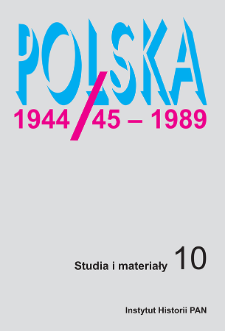- Wyszukaj w całym Repozytorium
- Piśmiennictwo i mapy
- Archeologia
- Baza Młynów
- Nauki przyrodnicze
Wyszukiwanie zaawansowane
Wyszukiwanie zaawansowane
Wyszukiwanie zaawansowane
Wyszukiwanie zaawansowane
Wyszukiwanie zaawansowane

Obiekt
Tytuł: Polska emigracja polityczna wobec procesów sądowych Wiktora Krawczenki i Davida Rousseta (1949–1951) : przyczynek do historii zimnej wojny
Inny tytuł:
Polska 1944/45-1989 : studia i materiały 10 (2011)
Współtwórca:
Instytut Historii Polskiej Akademii Nauk
Wydawca:
Miejsce wydania:
Opis:
Typ obiektu:
Abstrakt:
The largest group of Gulag survivors who reached the West were the soldiers of General Anders Army. The importance of their testimony was obvious from the very beginning, thus two secret offices were set up in 1943–1944 to systematically gather and analyse their evidence. The offices publications did not receive a wide response, but their fragments were amply quoted by Sovietologists in the USA.The Americans and their allies, who at the beginning of the Cold War offered the suggestion to the Economic and Social Council of the United Nations that an investigation into forced labour in the USSR should be launched, referred to the data included in Sovietologists works. Polish emigrants seized the opportunity to publicise their own testimonies. To this end, they established in Great Britain the Polish Association of Former Soviet Political Prisoners. The cause was supported by the Association of Polish Journalists in Exile. Yet, initially, Parisian episodes of that propaganda campaign had escaped the notice of the two organisations that were focusing their attention on the territory of Great Britain.The initial interest in the subject of Gulag was generated by Victor Kravchenko, an author of best-selling memories from his stay in the USSR, who brought a libel lawsuit against a French communist weekly “Les Lettres Françaises”. The only Polish group ready to cooperate with Kravchenko was the community of “Kultura” (“Culture”), a Polish periodical published in Paris. And it was this very group that as the first one paid attention to the initiative of a French journalist, David Rousset, who in his press appeal quoted Polish Gulag testimonies. Also Rousset sued “Les Lettres Françaises” in a French court. Thanks to the support of Jerzy Giedroyć and Jerzy Czapski, he established contacts with the abovementioned Polish émigré organisations and gained an access to the evidence materials and witnesses to win the case.
Czasopismo/Seria/cykl:
Polska 1944/45-1989 : studia i materiały
Tom:
Strona pocz.:
Strona końc.:
Szczegółowy typ zasobu:
Format:
Identyfikator zasobu:
oai:rcin.org.pl:59704 ; 2450-8357
Źródło:
IH PAN, sygn. B.155/10 Podr. ; IH PAN, sygn. B.156/10 ; kliknij tutaj, żeby przejść
Język:
Język streszczenia:
Prawa:
Licencja Creative Commons Uznanie autorstwa-Bez utworów zależnych 4.0
Zasady wykorzystania:
Zasób chroniony prawem autorskim. [CC BY-ND 4.0 Międzynarodowe] Korzystanie dozwolone zgodnie z licencją Creative Commons Uznanie autorstwa-Bez utworów zależnych 4.0, której pełne postanowienia dostępne są pod adresem: ; -
Digitalizacja:
Instytut Historii Polskiej Akademii Nauk
Lokalizacja oryginału:
Biblioteka Instytutu Historii PAN
Dostęp:
Kolekcje, do których przypisany jest obiekt:
- Repozytorium Cyfrowe Instytutów Naukowych > Kolekcje Partnerów > Instytut Historii PAN > Czasopisma
- Repozytorium Cyfrowe Instytutów Naukowych > Kolekcje Partnerów > Instytut Historii PAN > Wydawnictwa Instytutu
- Repozytorium Cyfrowe Instytutów Naukowych > Kolekcje Partnerów > Instytut Historii PAN > Wydawnictwa Instytutu > Czasopisma
- Repozytorium Cyfrowe Instytutów Naukowych > Kolekcje Partnerów > Instytut Historii PAN > Wydawnictwa Instytutu > Czasopisma > Polska 1944/45-1989
- Repozytorium Cyfrowe Instytutów Naukowych > Piśmiennictwo > Czasopisma/Artykuły
Data ostatniej modyfikacji:
16 gru 2020
Data dodania obiektu:
21 wrz 2016
Liczba pobrań / odtworzeń:
360
Wszystkie dostępne wersje tego obiektu:
https://rcin.org.pl./publication/78853
Wyświetl opis w formacie RDF:
Wyświetl opis w formacie RDFa:
Wyświetl opis w formacie OAI-PMH:
Obiekty Podobne
Bielicki, Paweł
Jackowska, Anna Maria
Jackowska, Anna Maria
Jackowska, Anna Maria
Krężołek, Edyta Jackowska, Anna Maria
Borodziej, Włodzimierz (1956–2021) Madajczyk, Czesław (1921–2008) Zyblikiewicz, Lubomir (1943– )
Eisler, Jerzy (1952– ) Jackowska, Anna Maria Kaliski, Bartosz (1977– ) Kozłowski, Tomasz Leszkowicz, Tomasz

 INSTYTUT ARCHEOLOGII I ETNOLOGII POLSKIEJ AKADEMII NAUK
INSTYTUT ARCHEOLOGII I ETNOLOGII POLSKIEJ AKADEMII NAUK
 INSTYTUT BADAŃ LITERACKICH POLSKIEJ AKADEMII NAUK
INSTYTUT BADAŃ LITERACKICH POLSKIEJ AKADEMII NAUK
 INSTYTUT BADAWCZY LEŚNICTWA
INSTYTUT BADAWCZY LEŚNICTWA
 INSTYTUT BIOLOGII DOŚWIADCZALNEJ IM. MARCELEGO NENCKIEGO POLSKIEJ AKADEMII NAUK
INSTYTUT BIOLOGII DOŚWIADCZALNEJ IM. MARCELEGO NENCKIEGO POLSKIEJ AKADEMII NAUK
 INSTYTUT BIOLOGII SSAKÓW POLSKIEJ AKADEMII NAUK
INSTYTUT BIOLOGII SSAKÓW POLSKIEJ AKADEMII NAUK
 INSTYTUT CHEMII FIZYCZNEJ PAN
INSTYTUT CHEMII FIZYCZNEJ PAN
 INSTYTUT CHEMII ORGANICZNEJ PAN
INSTYTUT CHEMII ORGANICZNEJ PAN
 INSTYTUT FILOZOFII I SOCJOLOGII PAN
INSTYTUT FILOZOFII I SOCJOLOGII PAN
 INSTYTUT GEOGRAFII I PRZESTRZENNEGO ZAGOSPODAROWANIA PAN
INSTYTUT GEOGRAFII I PRZESTRZENNEGO ZAGOSPODAROWANIA PAN
 INSTYTUT HISTORII im. TADEUSZA MANTEUFFLA POLSKIEJ AKADEMII NAUK
INSTYTUT HISTORII im. TADEUSZA MANTEUFFLA POLSKIEJ AKADEMII NAUK
 INSTYTUT JĘZYKA POLSKIEGO POLSKIEJ AKADEMII NAUK
INSTYTUT JĘZYKA POLSKIEGO POLSKIEJ AKADEMII NAUK
 INSTYTUT MATEMATYCZNY PAN
INSTYTUT MATEMATYCZNY PAN
 INSTYTUT MEDYCYNY DOŚWIADCZALNEJ I KLINICZNEJ IM.MIROSŁAWA MOSSAKOWSKIEGO POLSKIEJ AKADEMII NAUK
INSTYTUT MEDYCYNY DOŚWIADCZALNEJ I KLINICZNEJ IM.MIROSŁAWA MOSSAKOWSKIEGO POLSKIEJ AKADEMII NAUK
 INSTYTUT PODSTAWOWYCH PROBLEMÓW TECHNIKI PAN
INSTYTUT PODSTAWOWYCH PROBLEMÓW TECHNIKI PAN
 INSTYTUT SLAWISTYKI PAN
INSTYTUT SLAWISTYKI PAN
 SIEĆ BADAWCZA ŁUKASIEWICZ - INSTYTUT TECHNOLOGII MATERIAŁÓW ELEKTRONICZNYCH
SIEĆ BADAWCZA ŁUKASIEWICZ - INSTYTUT TECHNOLOGII MATERIAŁÓW ELEKTRONICZNYCH
 MUZEUM I INSTYTUT ZOOLOGII POLSKIEJ AKADEMII NAUK
MUZEUM I INSTYTUT ZOOLOGII POLSKIEJ AKADEMII NAUK
 INSTYTUT BADAŃ SYSTEMOWYCH PAN
INSTYTUT BADAŃ SYSTEMOWYCH PAN
 INSTYTUT BOTANIKI IM. WŁADYSŁAWA SZAFERA POLSKIEJ AKADEMII NAUK
INSTYTUT BOTANIKI IM. WŁADYSŁAWA SZAFERA POLSKIEJ AKADEMII NAUK




































